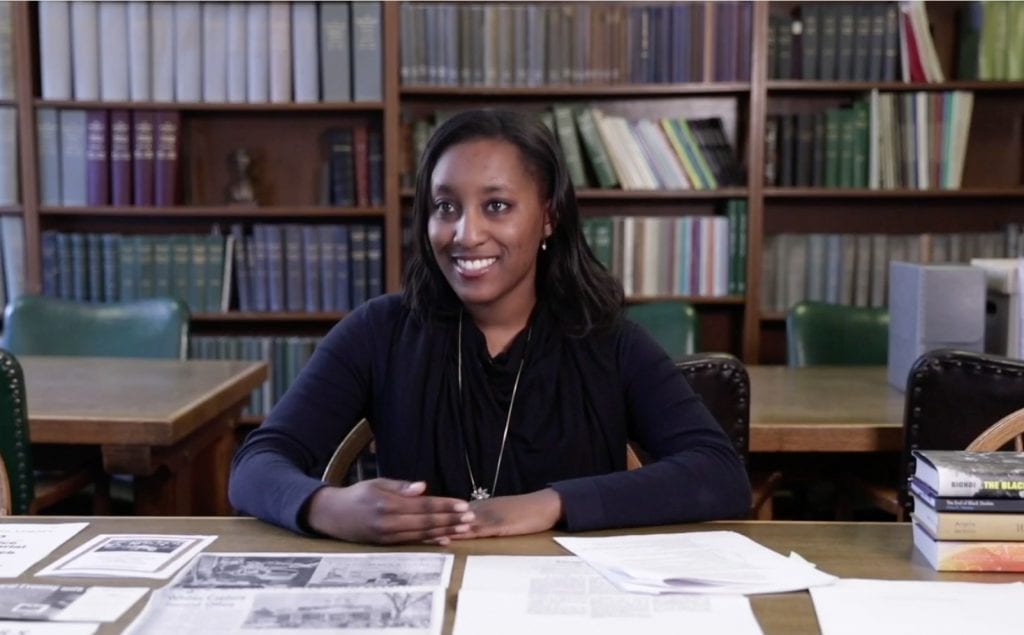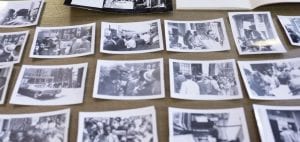By Charla Wilson
Just one year ago, I joined Northwestern University Libraries as the first Archivist for the Black Experience. This position was created to respond to a need: Where are people of color in the documentation of university history?
The question was asked, with greater and greater urgency, as the Northwestern University Black Alumni Association prepared for the 50th anniversary of the most historic political action by black students at Northwestern — the Bursar’s Office Takeover of 1968. It became more and more apparent that significant documentation of the lives of black students on campus was lacking. NUBAA held Northwestern to account, and the creation of my position was one of the first steps taken at the Libraries to address these gaps, to make our picture of history more complete, and to pay better attention to under-represented voices in our archives.
One year in, I see the challenges we have before us, even as I take pride in the accomplishments we’ve already made.
Working with hidden histories
My background for this work has been heavily informed by my time in the museum field preserving under-represented stories. I previously worked as the librarian/archivist for the Kumeyaay-DiegueñoPeople of San Diego at Barona Cultural Center & Museum. Before that I was the Library, Archive, and Museum Collections Manager at the Women’s Museum of California.
My interest in archival work peaked when I did graduate research on the San Diego Young Women’s Christian Association’s segregated Clay Avenue facility for African American women and girls from the 1920s to 1950s. It is a fascinating story of black women who transformed a traditionally recreational organization into a body that serviced the larger black community at the local level. It was the first and only social services agency for African Americans that provided employment opportunities, housing, and functioned as a space to mobilize for civil rights in the city.
Still the local collections do not reflect a wide array of additional stories about the black experience in San Diego. The realization that there are possibly hidden and forgotten histories about African Americans in San Diego was my motivation for building a career around safeguarding accounts of African American history in archives. Therefore, I recognize how special and important my responsibilities are at Northwestern University. In fact, I feel particularly honored to have the opportunity to work with African American collections as someone who is originally from San Diego, where African Americans collections are sparse.
Listening for what’s not there
This past year I participated in a history conference at which the theme was “hearing silences” in records at archives, libraries, and museums. Organizers encouraged attendees to be aware of missing voices, perspectives, and experiences at record-keeping organizations. But it is not enough to acknowledge that silences exist, it requires a response to address the absence.
That’s how I see my position as Archivist for the Black Experience.
For example, as I familiarized myself with our holdings about the Takeover, and began reaching out to participants, I noticed that our telling of the Takeover focused heavily around the men who participated. But I knew that women were not only participants, but leaders of the movement.
As a result we made particular outreach to alumnae such as Kathryn Ogletree ’71 ’76, president of the For Members Only student organization, who played a key role in planning the Takeover. When black students debated their word choice when presenting their frustrations to the university, it was Ogletree who urged they use the word “demands,” over less confrontational words like “concerns.” I am still making sure that strong voices like Ogletree’s are represented in our records of the Takeover, along with other women participants like Eva Jefferson Paterson ’71, an influential civil rights lawyer,and Daphne Maxwell Reid ’70, a charismatic and creative force who has had a remarkable career in modeling, acting, and fashion since the protest.
Earlier this year, I organized a small reception for students to honor the upcoming wedding of Prince Harry to Megan Markle ’03. In the months leading up to the event, many critics questioned Markle’s “blackness” as the wedding approached. But her story isn’t just that of a duchess who disrupted a historically all-white house of royalty, but that of a student at Northwestern, working to find her voice in a world where race and categorization define so much of how we are perceived.
Following the event, a grateful student, herself of mixed race, approached me to ask that experiences such as hers would not be excluded in the work I do.
And rightly so. Because the black experience is not monolithic, but multifaceted. It is the job of all of us at Northwestern Libraries to ensure that we hear the silences in the stories told by our archives, and that we work to amplify the voices that would otherwise be missing.
I feel privileged to do this work. I recognize that it is a unique opportunity. I have yet to find another archivist at a university that is not at a Historically Black College and University that shares this mission. I look forward to doing future projects and educating the community about other aspects of the black experience at Northwestern University.
If you are interested in more, please check out the archival research guide to the Black experience at Northwestern University.


